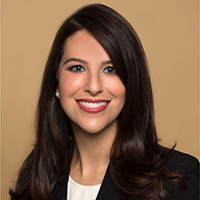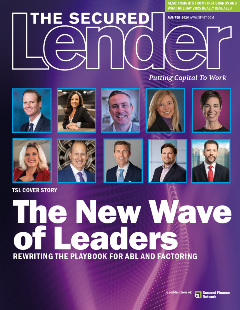
Lindsay Gray
Managing Director, Wells Fargo Capital Finance
Lindsay Gray is a managing director within Wells Fargo Capital Finance responsible for covering private equity and investment banking relationships and executing new financing transactions with public and private companies. A financial services veteran, she has served in various roles throughout her career in investment banking, credit management, underwriting and business development. She began her career at Wachovia Securities as an analyst in the Investment Bank. Prior to joining Wells Fargo, Lindsay was a senior vice president at Bank of America and worked in several areas including commercial real estate, asset-based lending, and commercial banking. She also served as a member of the Midwest Executive Council for Global Commercial Banking, acting in an advisory role to senior leadership.
Lindsay attended Indiana University, where she received her undergraduate degree in marketing, management and international business from the Kelley School of Business. She is a board member of the Middle Market Open, which benefits the National Kidney Foundation of Illinois and a member of the Women’s Leadership Committee for the Illinois Holocaust Museum.
What advice would you offer to women just starting out in the industry?
Ask questions and build relationships. This holds true for everyone at the beginning of their careers.
I see too many people who are concerned about asking necessary questions because they don’t want leaders to have a lesser opinion of them. I am impressed by those who ask the right questions, no matter how many. Each deal has its own nuances and each business has its own unique characteristics. You see something new with every transaction. Everyone has more to learn in this industry.
Building relationships is an extremely important aspect of our business. It’s important to remember that relationship building internally is just as important externally. Within your firm, there are individuals that can help you learn the business and can advocate for you when opportunities for growth become available. External relationships can help you with referrals, put the right capital structure together, and connect you with others that can get a deal over the finish line.
What role has mentoring played in your career?
Mentoring has played a very big role in my career. For the initial 10 years of my career, I worked in and around commercial real estate. I made a switch to ABL, and needed to learn an entirely different set of skills. Mentors of all experience levels helped me do that. Whether it was an analyst in the group or senior leadership, the group helped me get up to speed quickly and entertained my constant questions. Mentors have also advocated for me in different roles and have helped me continually improve with great advice and constructive feedback throughout my career.
What do you enjoy most about your role? Least?
I truly enjoy getting to know others and building relationships. It turns out that there are a lot of very interesting people that work in this industry and a lot of really fascinating business owners. I also enjoy the problem-solving aspect of my role. Learning how a company operates and how they want to grow or change, and helping them put together the right capital structure to effectuate their goals is very rewarding.
The aspect that I enjoy least is losing. Losing a deal doesn’t go well with my competitive nature.
How can commercial finance organizations attract and retain more women?
I think attracting more women starts with recruiting, especially at the university level. Larger firms can also leverage talent within their organization that may be in other divisions. I started my career in investment banking and continued with a focus on real estate and a manager in the ABL group took a chance on hiring me, and I am very appreciative of the opportunity that was afforded to me.
With regard to retaining women, we all need to do a better job of making ourselves available to young talent via mentoring. I make it a point to check in on our younger associates to let them know I am available to them at any time as a sounding board, to discuss career progression, etc. The more senior leaders that make themselves available to individuals earlier in their careers, the more connected talent will feel to our industry and their respective firms. In turn, those individuals can ultimately be a part of the next generation of leadership within our industry.
The Secured Lender

SFNet's The Year Ahead Issue


